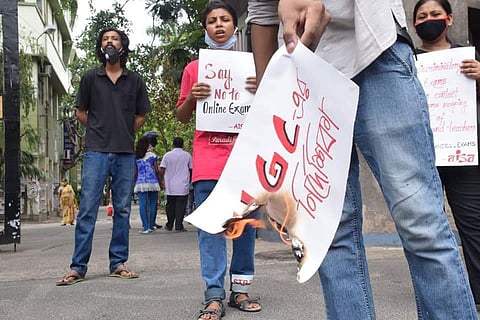

The All India Forum to Save Public Education, a platform consisting of multiple students’ organisations, has called for a nationwide protest against the University Grants Commission's (UGC) decision to conduct final-year exams by the end of September. The ways of protests have changed and marches have shifted shape to Twitter storms and that's what the students have planned on July 11 to kick off their four-day protest.
Joint protest against the 'anti-student' policies will be organised on July 11, said a statement from the forum — this will include a mass mail to the MHRD and a Twitter storm. Students also burned the UGC guidelines in protest. July 12 will see students uploading videos on social media explaining why they are opposing the decision. The students will take to all social media platforms to stage virtual protests. They also plan to burn notices of Home Ministry, MHRD, UGC and other concerned authorities of different universities for taking exams amidst pandemic, burn effigies of Amit Shah and Ramesh Pokhriyal "for pushing students towards a health crisis". "A signature campaign be raised to collect signatures online and send them to the MHRD. We'll send mass email. All administrative offices of the education department will be gheraoed maintaining physical distance," said the statement.
The government has, in the past, not been very favourable towards accepting terms of protestors but the students say it is their right and they have to listen. "The protests are about the lives of millions of students. The government cannot take decisions about the students' lives for their political upmanship. We're not protesting out of choice, but because it's our responsibility to resist any system of evaluation that is going to leave out a large section of marginalized students from its ambit. The government will have to pay heed to our voices as we are the most important stakeholders," said Apeksha Priyadarshini, a student activist from JNU and a member of BASO.
The matter is simple, said AISA President N Sai Balaji. "Students' lives matter. Their lives cant be put at risk. The government has to extend the academic year and hold exams post the pandemic or evaluate students based on previous years marks and internal marks. They can't hold both online or offline exams during the pandemic," said Balaji.
The students also said that it is not true that online examinations will be more credible. "Looking at the manner in which the Central Government has failed in controlling the trajectory of the pandemic, it is clear that most universities will not be able to hold exams of any sort. All Universities have systems, methods, and procedures to ensure the fairness, credibility and integrity of examinations conducted in the regular pen and paper mode. These, however, cannot work if the examinations are held in online mode. In such circumstances, it is also not true that online examinations will give a more credible and meaningful assessment of a student’s capability and learning than other available alternatives — like internal or continuous assessment through means other than examinations in their final year courses," said the students' forum.
The students are set to take matters to the court. SFI General Secretary Mayukh Biswas said that they are exploring legal options. "Protests have already started across the country and we will send the ministry a mass mail as well. There are medical students who will also be affected by this decision. They have been fighting the virus and keeping us safe for all these days and have been suddenly told that they would have to take the exams as well. This is just not fair," he added.
When the Coronavirus pandemic struck India, protests had taken a hit but the students and activists bounced back with a virtual alternative much before political parties shifted to virtual rallies and the virtual world has its own merits. "Although physical protests are irreplaceable and have their own significance, the restricting of our spaces to social media during the pandemic have actually helped students connect and network more effectively than before because now our energies are solely diverted here. Newer solidarities are forging as the government is consistently attacking activists from amongst us and if we have to resist it at this hour, we can only do that in a united manner," said Apeksha.
